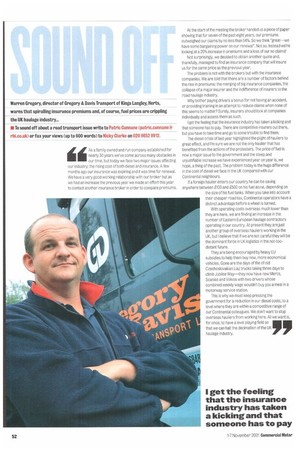d As a family owned and run company established for
Page 52

If you've noticed an error in this article please click here to report it so we can fix it.
nearly 30 years we've come across many obstacles in our time, but today we face two major issues affecting our industry: the rising cost of both diesel and insurance. A few months ago our insurance was expiring and it was time for renewal. We have a very good working relationship with our broker but as we had an increase the previous year we made an effort this year to contact another insurance broker in order to compare premiums. At the start of the meeting the broker handed us a piece of paper showing that for seven of the past eight years, our premiums outweighed our claims by no less than 54%. So we think "great—we have some bargaining power on our renewal". Not so. Instead were looking at a 20% increase in premiums and a loss of our no claims!
Not surprisingly, we decided to obtain another quote and, thankfully, managed to find an insurance company that will insure us for the same price as the previous year.
The problem is not with the brokers but with the insurance companies. We are told that there are a number of factors behind the rise in premiums: the merging of big insurance companies, the collapse of a major insurer and the indifference of insurers to the road haulage industry.
Why bother paying drivers a bonus for not having an accident, or providing training in an attempt to reduce claims when none of this seems to matter? Surely, insurers should look at companies individually and assess them as such.
I get the feeling that the insurance industry has taken a kicking and that someone has to pay. There are competitive insurers out there, but you have to take time and go to some trouble to find them.
The diesel crisis of last year highlighted the plight of hauliers to great effect, and I'm sure we are not the only haulier that has benefited from the actions of the protesters. The price of fuel is now a major issue to the government and the steep and unjustifiable increase we have experienced year on year is, we hope, a thing of the past. The problem today is the huge difference in the cost of diesel we face in the UK compared with our Continental neighbours.
If a foreign haulier enters our country he can be saving anywhere between £100 and £500 on his fuel alone, depending on the size of his fuel tanks. When you take into account their cheaper road tax, Continental operators have a distinct advantage before a wheel is turned.
With operating costs overseas much lower than they are here, we are finding an increase in the number of Eastern European haulage contractors operating in our country. At present they are just another group of overseas hauliers working in the UK, but I believe that if we are not careful they will be the dominant force in UK logistics in the not-toodistant future.
They are being encouraged by heavy EU subsidies to help them buy new, more economical vehicles. Gone are the days of the of old Czechoslovakian Liaz trucks taking three days to climb Jubilee Way—they now have new Mercs, Scanias and Volvos with two drivers whose combined weekly wage wouldn't buy you a meal in a motorway service station.
This is why we must keep pressing the government for a reduction in our diesel costs, to a level where they are within a competitive range of our Continental colleagues. We don't want to stop overseas hauliers from working here. All we want is, for once, to have a level playing field so that we can halt the decimation of the UK haulage industry.
















































































































































